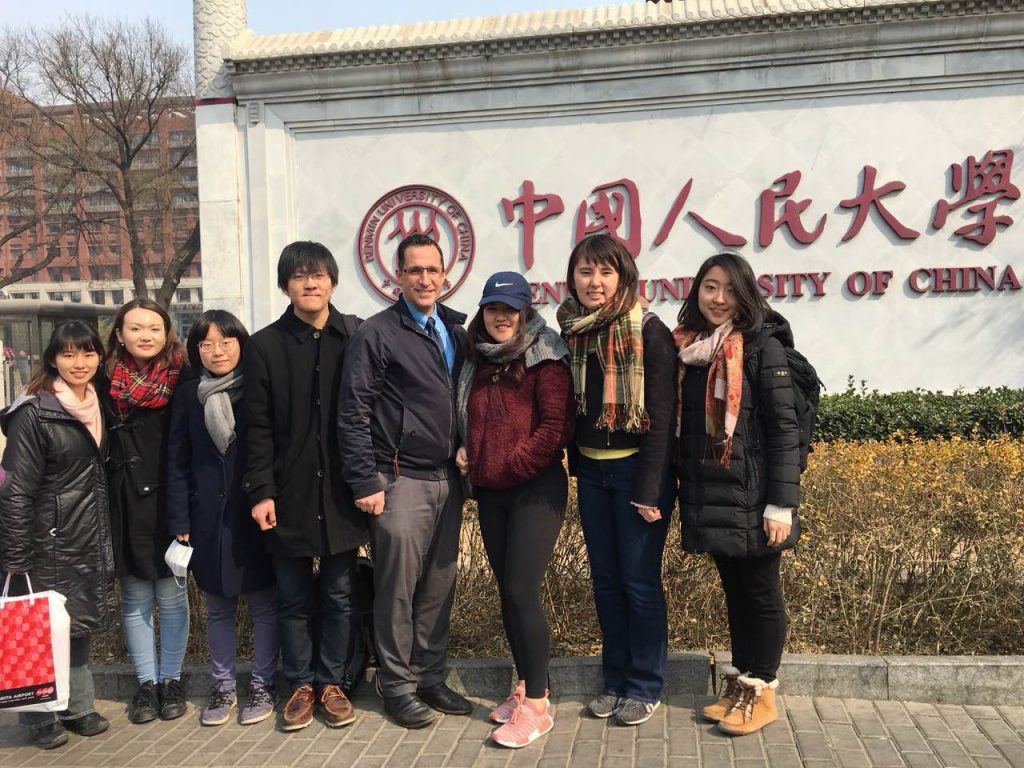2018 Global Link China Participants Share Their Experiences
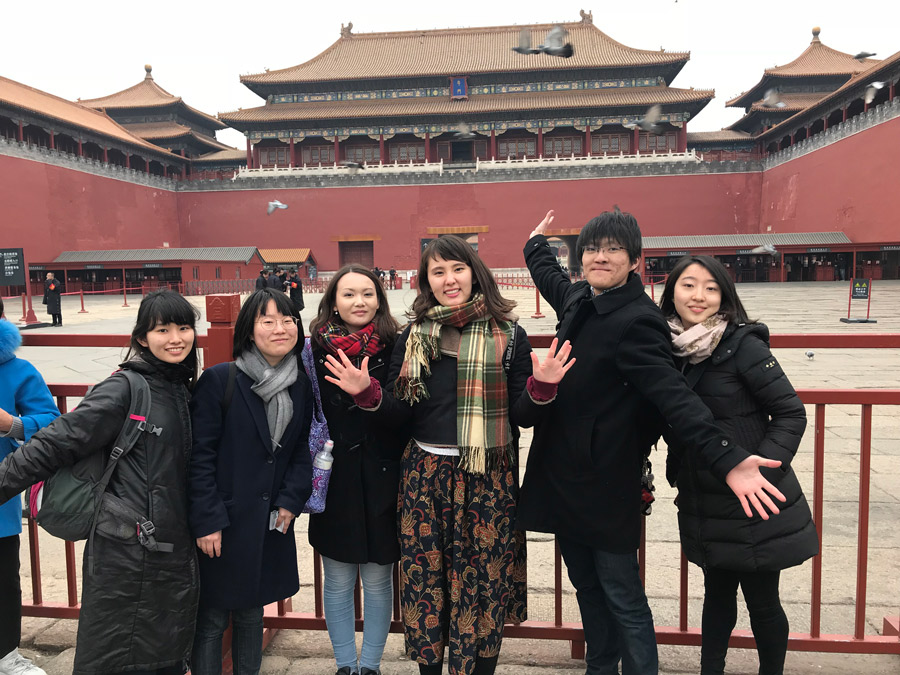
From March 7th to 20th, Professor Stephen Nagy led a group of six ICU students on the 2018 Global Link China (GL China) program. Previously known as the Japan-China Young Leaders Development Project, GL China offers ICU students the opportunity to foster a deeper understanding of Sino-Japanese relations through direct interaction between youth in Japan and China. During the 14-day trip, participants visited three cities–Beijing, Shanghai and Nanjing–where they had the opportunity to attend lectures at various Chinese universities to deepen their knowledge on China, its citizens’ worldviews and their perspectives on Sino-Japanese relations. More importantly, ICU students interacted and engaged with Chinese college students both in the classrooms and lecture halls, and during shared meals and site visits. The trip would not have been complete without a visit to several notable historical sites such as the Great Wall of China, Tiananmen Square, the Forbidden City, Yuyuan Gardens and the Bund. Participants were also expected to conduct a short-term research project based on issues of interest to them. Below are reflection pieces from all six participants, as well as from one ICU student who joined the program while visiting family in China.
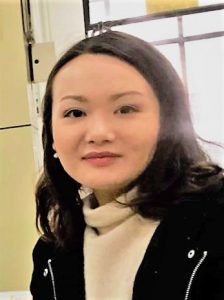 Erika Kuti
Erika Kuti
The moment we landed in Shanghai from Beijing, on our second leg of the Global Link China program, I recognized a regional or city to city dichotomy within China. While cruising down the highway in 20 degrees Celsius weather, with the windows rolled down in the taxi, I saw a sharp contrast between the smoggy dark Beijing and the seaside Shanghai. Previously when I read or talked about China I would find myself thinking of a place that was entirely faced by heavy pollution and surveillance as strict as the 1984 world of George Orwell. However, after leaving Beijing I found my VPN service to work faster and I witnessed crowds of tourists including many young Japanese. I saw a parallel between Shanghai and Yokohama due to their histories as ports used by westerners and their modern commercialized feel. I was in awe over Shanghai and took many pictures at the Bund but this feeling of an excited tourist slowly receded when I began to think of much of Western China that lives in ways that of third world countries such as Xinjiang Province which even faces problems such as terrorism and separatist movements concerning the Uyghur ethnic group. Overall, the paradox between Shanghai and the rest of China was astonishing to me.
As for my research question concerning Chinese and Japanese historical memory, through realizing the stark differences between different regions in China, it was clear that China is in the process of nation-building. In order to create and unite a nation out of the vast and ethnically diverse China, as a developing nation, China needed to create its national image or identity through the use of wartime memories of fighting the Japanese Imperial Powers. However, my assumption that all Chinese, even youths, harbored strong negative feelings towards Japan was wrong. After speaking with students in China Foreign Affairs University in Beijing it was clear that many young people in China enjoy Japanese culture and media through animated films or music. The Chinese students, who although were elites, were also critical of the Chinese government in our discussions concerning the recent changes in the Chinese constitution. Also, it was interesting to see that the students we met all possessed VPN even though they have never left China before. Through this student to student interaction, I felt more similarities rather than differences between each other as university students.
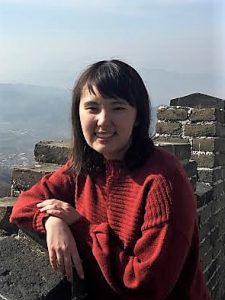 Rena Yamazaki
Rena Yamazaki
I believe this trip was a life-changing experience. Having lived in Japan and the United States, I grew up with a biased view of China as the media tends to focus on the negative aspects of China such as pollution, censorship, and government corruption. Although it may seem obvious, I think that we tend to forget that what a country is “said” to be like is often drastically different from its reality.
The most memorable experience from this trip was visiting the Nanjing Massacre Museum. This museum portrayed history very emotionally, with multiple references of the Japanese invaders being “killers,” “savages,” and “devils.” This narrative is drastically different from that of the atomic bomb museum in both Nagasaki and Hiroshima, where they victimize the Japanese. History is crafted and told in two ways when comparing the Japanese and Chinese museums. For the Japanese, World War II is memorized as a war against the United States, in which the Japanese were the victims. For the Chinese, war is memorized as being against the Japanese imperialists that forcefully invaded their land. So what is history? And what is truth and fact?
As we have these distinct interpretations of history, historical topics become more and more emotional and controversial, making it harder for countries to reach consensus and harmony. Trying to solve these disagreements is an extremely difficult problem. Through visiting the Nanjing Museum and taking part in this program, I learned the dangers of having a biased knowledge and mindset, and the importance of recognizing diverse viewpoints and interpretations. Although the two cultures are vastly different, we are also very much alike, and we should all recognize these differences and similarities in order to improve Sino-Japanese relations.
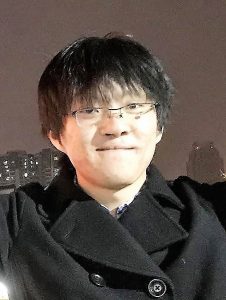 Takahiro Sano
Takahiro Sano
One of the most memorable experiences was discussing Japan-China relations, culture and historical perception with students of China Foreign Affairs University and Nanjing University. These discussions were really eye-opening experiences for me because we could know how Chinese people thought about Japan. In terms of culture, the students said many Chinese were favorable towards Japan but they were also concerned about Japanese attitude towards history. Despite Japanese people having negative images of China, Chinese people have positive images on Japanese. Through these discussions, I concluded that what is needed to improve and strengthen Japan-China relations are heart to heart understanding and a correct and appropriate understanding about history.
In more personal terms, learning Chinese history and questioning Chinese professors were really fruitful for me. History and culture are essential elements to shape countries’ international relations and through this trip, visiting temples and museums, I could understand why China behaves such in the international community. Furthermore, the focus of my questioning was that I wanted to know what Chinese people think the best solution for Japan-China problems are. Their answers were different from what I expected. They put a focus on economic cooperation instead of solving territorial issues. Through this surprise, I concluded that what we should focus on is understanding each other before starting to solve the problems. Through this trip, I found many new things and what we know about China is a tiny portion of the whole China.
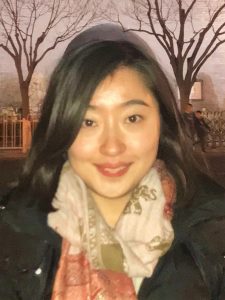 Aika Udagawa
Aika Udagawa
Spending two weeks in Beijing, Shanghai, and Nanjing – the political, economic, and historical centers of China – was an influential experience that allowed me to directly observe the rapid economic growth of China, as well as the hopes and dreams that Chinese people have for their nation. The part that made the biggest impression on me was hearing many of the people we spoke to mentioning that they believed Western nations were misunderstanding the national Chinese agenda. While discussing the economic development and expanding political influence of China, I began to understand the importance of critically examining the language used when Japan and Western countries discuss China, as well as understanding the complicated structure of Chinese government.
Through numerous first-hand experiences (lectures from researchers, speaking with Chinese students, visiting the Memorial Hall of the Victims in Nanjing Massacre) I was able to expand on my research topic, “The Cause of the Problems Surrounding Sino-Japanese Historical Acknowledgement”. I realized that the conflicts revolving around historical acknowledgement aren’t only about diplomacy, but also have to do with numerous other angles such as East Asian hegemonic politics and domestic Japanese political issues. Strengthening the mutual trust between both countries is also an important part of moving forward with solving these problems.
 Hasumi Tani
Hasumi Tani
As a Chinese person with a Japanese nationality, this program gave me a new perspective on Sino-Japan relations. One of my favorite conversations was on the Belt and Road Initiative (BRI) with the secretary general of the Chinese Association for International Understanding (CAFIU) in Beijing. During the conference with Mr. Zhu Rui, the secretary general of CAFIU, we were able to hear China’s official statement on the BRI. It was interesting to hear the Chinese government’s definition on the BRI, because prior to this program, I have done research on the BRI and its effects on Asian regionalism in ICU. Needless to say, I obtained information about the BRI through academic materials written by international scholars. This gave me a comparison between the difference images of the BRI from an international point of view and a domestic (Chinese) point of view.
During this program, I found a new side of China that I didn’t know. As a student who’s spent most of her years in Shanghai, it was an eye-opening experience for me to revisit the country as a Japanese college student. I hope this program continues to thrive and attract more ICU students in the future.
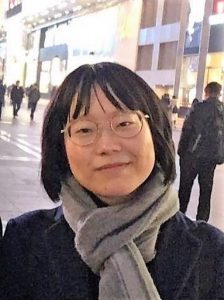 Hinako Unno
Hinako Unno
My study trip exceeded my expectations. I learned a lot about China and its people, culture, politics, and history in such a short period. I also learned about Japan, too. Listening to lectures by Chinese researchers, visiting museums and temples, and walking the streets interacting with professors, students, and citizens were wonderful opportunities that allowed me know this country from a different and more realistic point of view. . Being Japanese, understanding this country was more difficult than I thought it would be. Attending public school in Japan, I realized that I had an entirely different way of thinking about societal standards and Sino-Japanese government policies compared to my Chinese peers. My first step was reconciling these differences to see the country accurately. Although we had different ideas on the Chinese society and politics and our differences were often confusing, I still had good conversations. I really appreciate Chinese people, who generously tell and teach me about China and respect Japanese people.
This trip became my time to rethink the understandings I had of my country, my identity and the relationship between Japan and China. Chinese people told me what I had never considered about political systems, democracy, and the ideal society. Their opinions stimulated me to try to understand those themes further away from my own biases and what I was told in schools. It required a more open-minded attitude toward my own common sense. By forcing myself to become more objective in my knowledge, I allowed myself to learn more about Japan and its politics by comparing it to China.
Every moment in China was eye-opening for me, and the trip strengthened my affinity to China. I am grateful to Professor Nagy for teaching and guiding us in China.
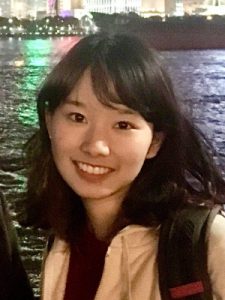 Miho Haneda
Miho Haneda
My freshman year has been even more successful and fulfilling, thanks to the stunning two-week-program in China. Throughout this tour, we were able to recognize China and Chinese culture in a less biased way, as well as to see Japan from a different perspective. China is hardly the air-polluted, noisy, and aggressive country which we imagine, but is instead friendly, safe, and open. Since I am interested in personality development under each culture, I’ll share some observations of characteristic traits during this trip.
The existence of Chinese propaganda was beyond my expectation. Every minute we walked on a street, we saw another sign on a wall saying “equality, justice, patriotism, national enrichment etc.”. Some of the Chinese students told us that the first rule on a blackboard that school taught for students was to obey the party, not to keep the harmony, nor clean the classroom. Also, an interesting movie that I saw called “Amazing China” was released this March so that more people would praise the country. Talking to Chinese people, I realise that these kinds of propaganda shape Chinese minds so that they are confident of the country, society, and themselves. I believe this would work positively to develop its country, as long as people can accept diversity. At least, this is something that Japan should learn. Japan lacks confidence now and would be stronger there was more confidence. Professor Zhu Feng (朱锋) at Nanjing Institute for South China Seas Studies concluded his lecture with this message. “In my opinion, it is important to be proud of our country not so we can look down other cultures but to promote our prosperity to other countries.”
It is no doubt that China has been a big power in Asia, and even the world. It is all up to the Japanese people whether we see this big power as a threat or an opportunity. I understand the difficulty of international politics, and that is especially why I believe more Japanese should know what is the real China and Chinese, and vice versa, as citizens. That being said, now I am motivated to take part in activities to introduce both countries’ culture. I really appreciate this opportunity to visit China.
